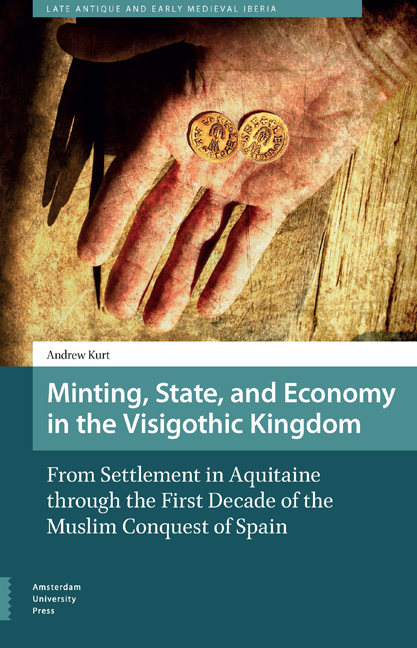 Minting, State, and Economy in the Visigothic Kingdom
Minting, State, and Economy in the Visigothic Kingdom Book contents
- Frontmatter
- Contents
- List of figures
- Acknowledgments
- Introduction
- 1 Pre-Regal Visigothic Coinage
- 2 The King’s Coinage: The Beginning and Development of theRegal Coinage (c. 573-c. 720) 81 A The Transition to a Regal
- 3 The Activities of the Mints from c. 573- c. 720
- 4 Why Were Gold Coins Struck in the Visigothic Kingdom?
- 5 The Royal Control of Visigothic Minting
- 6 Coinage in Spain in the Aftermath of the Islamic Conquest
- 7 Visigothic Currency in the Early Medieval Economy
- Conclusion
- Appendix I
- Appendix II
- Bibliography
- About the Author
- Index
- Frontmatter
- Contents
- List of figures
- Acknowledgments
- Introduction
- 1 Pre-Regal Visigothic Coinage
- 2 The King’s Coinage: The Beginning and Development of theRegal Coinage (c. 573-c. 720) 81 A The Transition to a Regal
- 3 The Activities of the Mints from c. 573- c. 720
- 4 Why Were Gold Coins Struck in the Visigothic Kingdom?
- 5 The Royal Control of Visigothic Minting
- 6 Coinage in Spain in the Aftermath of the Islamic Conquest
- 7 Visigothic Currency in the Early Medieval Economy
- Conclusion
- Appendix I
- Appendix II
- Bibliography
- About the Author
- Index
Summary
The Visigothic regime in Gaul and Iberia flourished during the latter stages of a long era now commonly referred to as late antiquity, which spanned from the troubles of the Roman Empire in the third century to the Islamic invasions across the vast expanse from Central Asia to Spain. The ancient Mediterranean, along which the Visigoths found their eventual home, is open to various conceptualizations. Ambitious approaches that examine a large span of cultures on a grand scale compete in a sense with a more isolated approach, focused, for instance, on Western Civilization. The latter perspective, channeled along a path centered on the developments of Greece and Rome, can be a legitimate focal point but should not be cut off from interactivity between the Mediterranean rim and regions well beyond it, not only in Western Europe but in the Near East and North Africa including the Red Sea region, which, in turn, was spurred by interaction with eastern Africa and the Indian Ocean peoples. The Mediterranean can be seen as a massive zone of contact with multiple micro-zones, which, at the same time, had unifying elements in political culture, economic activity, social and intellectual traditions, and religion. It saw tremendous continuity in some respects even as it experienced important changes as well as a diverse range. In studying the Mediterranean in the ancient and early medieval eras, one can work one's way around the region and become immersed in the particular characteristics of various sub-regions such as Hispania, Gallia, Italia, Graecia, and so on, but what can be at least as striking are basic consistencies. As new residents entered the European landscape and necessarily propeled modifications in public and private life, the firm foundation left by the Roman Empire established a pattern that deeply affected the new kingdoms of early Europe. This influence was felt to a greater or lesser extent in such areas as administration, religion, literary culture, military habits, rural and urban life and economy and, not least, currency.
The field of late antiquity has burgeoned in recent decades, as a new sense of the interconnections and significance of a broad sector of Afro-Eurasia across some five centuries has been accompanied by an enormous amount of specialized research focused within this world.
- Type
- Chapter
- Information
- Minting, State, and Economy in the Visigothic KingdomFrom Settlement in Aquitaine through the First Decade of the Muslim Conquest of Spain, pp. 11 - 24Publisher: Amsterdam University PressPrint publication year: 2020


